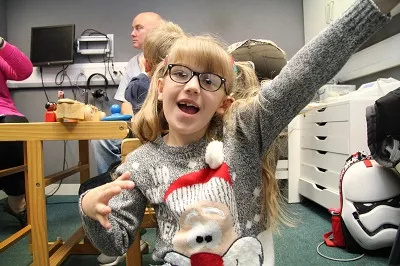Little girl finds her voice after pioneering brain surgery
Thursday 25 April 2019

A seven-year-old girl who was born with a rare form of deafness and never expected to speak can now tell her parents that she loves them thanks to pioneering brain surgery.
Leia Armitage was born without her cochlea and auditory nerve in both ears meaning she was profoundly deaf and could not benefit from even the most advanced hearing aids.
Her parents were told that she would only be able to communicate through British Sign Language.
But when she was 22 months old, Leia was the first child in London to undergo pioneering brain surgery to have an auditory brainstem implant (ABI).
The highly complex procedure involves inserting an electronic hearing device directly into the brainstem, bypassing the cochlea and auditory nerve entirely.
NHS England has announced that the cutting-edge surgery will be available for children on the NHS at Guy’s and St Thomas’ NHS Foundation Trust and Manchester University NHS Foundation Trust, and is expected to benefit around nine children a year.
Leia’s dad, Bob, 45 from Dagenham in Essex, said: “It was a huge decision for us because it involved complex brain surgery, but we decided to go for it because it was Leia’s only chance of ever hearing sound and we wanted to give her the best opportunity in life.
“Our expectations were never that high based on the experiences of a few other children around the world. We hoped that she would be able to hear environmental sounds, such as a car beeping its horn as she crossed the road, to make her safer in the world.”
Three surgeons from Guy’s and St Thomas’, King’s College Hospital and University College Hospital came together in May 2013 to operate on Leia at King’s College Hospital.
Professor Dan Jiang, one of the surgeons involved in Leia’s operation and head of the Hearing Implant Centre at Guy’s and St Thomas’, said: “Once the ABI has been activated, it can take years for children to learn to interpret the sound but, over time and with the support of audiology and speech therapists, Leia has been able to develop both her speech and sign language. Our whole team is very proud of the progress she has made."
Bob, who works for Royal Mail, said: “We were devastated when we found out Leia was missing her auditory nerve as well as her cochlea. We thought we had no hope as her deafness was so rare, but thanks to the ABI we’ve come so far.
“It’s taken over five years to get to this point and a lot of rehab but Leia has defied the odds and is now putting full sentences together and has a wider vocabulary. There’s nothing better than hearing her say ‘I love you daddy’.”
Leia’s implant was activated on her second birthday and she continues to receive support from the speech and language therapists at Guy’s and St Thomas’.
Her mum, Alison, said: “It’s been hard work and required a lot of determination from Leia, but in the last six months we’ve seen an increase in her using her voice. When I’m putting her to bed she now says ‘good night mummy’, which is something I never expected to hear.”
Professor Shakeel Saeed, one of the surgeon’s involved in Leia’s procedure, helped set up the ABI service at Guy’s and St Thomas’.
Professor Saeed, from University College Hospital, said: “We are delighted that Guy’s and St Thomas’ has been chosen as one of only two centres in the UK to offer auditory brainstem implants.
“This revolutionary treatment will be life-changing for children who are born without a cochlea or hearing nerves as it’s their only chance of ever hearing sound.”
An ABI has two parts – an external ‘processor’ worn behind the ear and the surgically implanted internal part.
A microphone on the processor picks up the sound around it and turns it from a sound wave into an electrical signal. The processor then transmits the sound signal to the internal part of the hearing implant.
This means that the implant is bypassing both the cochlea and the hearing nerve, taking a short cut to the brainstem to produce a sensation of sound.
Last updated: March 2022
Contact us
If you're a journalist and have a media enquiry, please contact us.
Phone: 020 7188 5577
Email: [email protected]